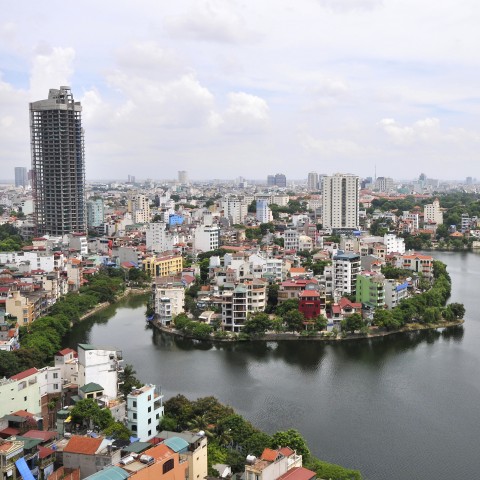
Four years ago I went to the Philippines to travel for the first time. I was so in love with the country that I couldn’t help but try to find a job there. I thought it was a nice country to live in and work in. A year later I got selected to join a short project in the Philippines for six months and, at the same time, that was when I started working for VietnamesePod101 as well.
If you visit Vietnam and decide to stay for an extended period, you should research how to find a job in Vietnam. Unless you’re a freelancer working remotely most of the time, you must somehow find a job or do something for a living when being abroad.
An expats satisfaction survey conducted in January 2021 shows that Vietnam is one of the top 10 countries where foreigners are happiest with both work and personal lives in 2021. Vietnam has become an extremely expat-friendly country in terms of job security and a stable local economy. It is surprisingly easy to find a job, especially when you’re a native English speaker, even with or without a degree.
In this article, I’m going to reveal all the job possibilities and the other non-teaching jobs that you can take into consideration in Vietnam based on my four year-experience using English as the second language in my work. There will also be some conditions such as a Vietnamese visa and other requirements which need to be fulfilled and hopefully, you will have a clear idea of what fits you most before deciding to move to Vietnam.
 Table of Contents
Table of Contents
- The job market in Vietnam overview
- Regular Hiring Procedure
- Language Teaching Jobs
- Blue-collar Jobs
- Office Jobs
- Health, science, and technology-related jobs:
- Start your own business
- Conclusion
1. The job market in Vietnam overview
Hanoi, Ho Chi Minh City, Danang, and Binh Duong are some of the cities that attract native English speakers most for their varieties of jobs. There are foreign companies or companies with foreign capital based in these cities as well. Therefore, the very first target if you aim for a chance of finding jobs in Vietnam should be in these places. The second city level that provides job options as well might be cities like Quang Ninh, Bac Ninh, Hue, Dong Nai, Vung Tau, and so on. The salary range can be smaller due to the smaller size of the city, but benefits are as good as in big cities since they want to attract strong candidates.

Due to great economic growth in recent years, Vietnam has opened up many diverse professions for not only locals but also expatriates. Aside from the very common teaching jobs in Vietnam, there are foreigners working as IT engineers, digital marketers, chefs, or managerial roles in big corporations. Accordingly, numerous job search websites have been launched to help candidates reach employers easier. Here is a list of websites and pages that you can absolutely take a look at when thinking of searching for a job in Vietnam.
- TopCV: Top CV was initially a website that provides resume templates. Later on, they connected with a wide network of employers and are currently recruiting tons of people and become one of the leading websites in the industry.
- Vietnamworks: There are thousands of jobs with attractive incomes from top companies in Vietnamworks. It’s easy to apply, jobs are of a good standard with high salaries, and there are attractive benefits. It’s also constantly updated with new work every day.
- Timviecnhanh: A partner of over 500,000 businesses, bringing many chances of getting a job for job seekers, Timviecnhanh has been a prestigious recruitment site in Vietnam and it’s very easy to sign up also.
- MyWork: Among job search websites in Vietnam, MyWork is a trusted, effective and prestigious job search page for candidates and employers. They also provide a hotline with a free consultation.
- CareerLink: CareerLink is Top 10 E-commerce enterprises in 2015 with over 22,000 attractive jobs.
- LinkedIn: a social network that focuses on businesses or professional individuals who need to connect for finding jobs and currently recruiting. A social networking site designed for the business community, LinkedIn’s goal is to allow users to network with people they know professionally.
- Facebook: Last but not least, there are a few big Facebook Groups in Vietnam where you can find job opportunities such as Hanoi Massive Job or Saigon Massive where you can ask anything related to the city.
2. Regular Hiring Procedure
Submitting a resume until getting a job can take approximately a week to a month. The usual hiring process in Vietnam is similar to everywhere else in the world, depending on the complexity of the job. It includes:
- Step 1 : Duyệt hồ sơ (Screen resume)
- Step 2 : Liên hệ phỏng vấn (Contact for an interview)
- Step 3 : Phỏng vấn với nhà tuyển dụng (Interview with employer)
- Step 4 : Nhận thư mời làm việc (Receive offer letter)
- Step 5 : Ký thoả thuận thử việc (Sign probation agreement)
- Step 6 : Ký hợp đồng chính thức (Sign official contract)
The probation period in Vietnam usually takes 2 months for regular positions and 1 month for managerial positions due to the lack of strong candidates. Employees who are on probation period are entitled to a wage. It may, however, equal 75-80% of a regular employee’s compensation and may not include any bonuses or benefits.
Volunteers can get paid sometimes depending on the project and organization. I may share with you more details about volunteering jobs in another article but within the framework of this one, I’m going to mostly discuss jobs that you officially get paid for.

3. Language Teaching Jobs
Vietnam’s education industry has been one of the leading markets in Asia for its potential and growth over the past years. Due to the high expectation of Vietnamese parents for their children’s English skills, as well as the requirement of adults’ English ability for many jobs, thousands of English centers were opened to meet the need for language learning.
Being an English teacher, therefore, has become the number one chance of getting a great life in Vietnam for native English speakers these days. Some of the most popular English centers throughout Vietnam are Apolo, Apax, Wall Street English, Language Link, VUS, Ames, ILA, CEC, Ocean Edu, and Amslink. The regular hourly rate that you might have seen ranges from $15 to $40 depending on the center and class type. Basic requirements include native English speakers with TESOL, TEFL, CELTA, or BA. English speakers that come from countries using English as the second language can possibly find a job in Vietnam as an English, math or science teacher in local schools as well. Benefits vary from business visas, work permits, health insurance, to paid holidays.

A regular hiring process usually includes 3 steps
- Interview with the Human Resource Department
- Interview with the Academic Department
- Demo class
Teaching experience is highly recommended but not a must when looking for teaching jobs in Vietnam. The training system in Vietnam is not flush with fancy video training or materials but it’s enough to provide you with the necessary tools and teaching techniques. At big and reputed English centers, the academic manager is often a native English speaker. However, in some smaller centers, this responsibility can be taken by a Vietnamese speaker.
To find a job in Vietnam as an English teacher, there is a chance of finding available positions in the English center that you’ve targeted directly, so you can avoid commission from agencies. On the other hand, some people may prefer working through agencies (Ex: New Way) because all the procedures and paperwork such as getting a Vietnamese visa can be fully taken care of. Another tip to get a teaching job in Vietnam is doing research beforehand because it will help when negotiating salaries with employers.
Knowing basic Vietnamese will help you understand the main difficulties of Vietnamese students, letting you make better teaching strategies. Bear in mind that teaching in public schools can be a little tiring due to the high student number as opposed to teaching in private English centers. Plus, you might be requested to do office hours or admin tasks in both environments which is perfectly common in Vietnam.
4. Blue-collar Jobs
Nhân viên bán hàng (sales person), giao hàng (delivery guy), bảo vệ (security guard), phụ bếp (kitchen assistant), or tài xế (driver) are considered blue-collar jobs in Vietnam.
Although the job title is not prestigious, blue-collar jobs in Vietnam contain a few advantages that are relatively suitable for people who don’t have a good deal of expertise:
- Dễ dàng tìm kiếm (Easy to search)
- Không yêu cầu bằng cấp và kinh nghiệm (Does not require qualifications and experience)
- Không đòi hỏi tay nghề cao (Does not require high skills)
- Không cần biết ngoại ngữ (Does not need to foreign languages)
However, there are undoubtedly several cons that blue-collar workers might face such as:
- Không phù hợp với người nước ngoài (Not suitable for foreigners)
- Lương thấp (Low salary)
- Không có cơ hội thăng tiến (No promotion opportunities)
Aside from the websites mentioned above, ViecLamTot is one of Vietnam’s first job-posting platforms specializing in blue-collar labor. In addition, ChoTot, Grab, Beamin, Shopee are platforms and marketplaces that provide numerous job opportunities in Vietnam for this group of workers as well. Blue-collar jobs require a lot of Vietnamese speaking and working under poor conditions. As a result, it’s not a good option for native English speakers in this case.
5. Office Jobs
Office jobs are often common everywhere in the world due to their stability and commitment. In Vietnam, some of the regular office jobs that you may see are:
- Lễ tân khách sạn (Receptionist)
- Trợ lý văn phòng (Office assistant)
- Nhân viên hành chính (Admin staff)
- Kế toán (Accountant)
- Giám đốc vận hành (Operations Manager)
- Trưởng phòng nhân sự (HR Manager)
- Nhân viên chăm sóc khách hàng (Customer Service Officer)
- Quản trị viên bán hàng (Sales admin)
Being an expat can be a huge advantage as an office worker due to the low percentage of Vietnamese adults who are proficient in English. Besides, the pros seem to be attractive for people who don’t have high demands in terms of work conditions.
- Nói tiếng Anh là một lợi thế (English speaking is an advantage)
- Công việc ổn định (Stable job)
- Thời gian làm việc cố định (Fixed working time)
- Phúc lợi tốt (Good benefits)
- Có cơ hội thăng tiến (Promotion opportunity)
On the other hand, there are a few cons that might make you consider learning Vietnamese and improving your speaking skills before applying for this kind of job, because it will help you adapt better to the environment.
- Mức lương trung bình (Average salary)
- Sử dụng nhiều tiếng Việt (Using a lot of Vietnamese)
- Ưu tiên người VIệt Nam với các vị trí thấp (Priority is given to Vietnamese in low positions)
- Các vị trí cấp cao ở các công ty nước ngoài thường ưu tiên tuyển dụng người nước ngoài (Senior positions in foreign companies often prioritize recruiting foreigners)
6. Health, science, and technology-related jobs:

If none of the jobs mentioned above seems to interest you, here is the list of occupations in other fields that you can also consider when looking for a job in Vietnam.
- Thiết kế (Designer)
- Chuyên viên y tế công cộng (Public Health Specialist)
- Giáo viên môn khoa học (Science Teacher)
- Kỹ sư dữ liệu (Data Engineer)
- Kỹ sư công nghệ thông tin (IT engineer)
- Người thử nghiệm (Tester)
- Bác sĩ (Doctor)
- Y tá (Nurse)
- Công việt viết lách (Writing job)
The medical industry always has a shortage of professors and doctors due to the high level of expertise and great work pressure. It happens in science, technology, and other specialized industries as well. Since these kinds of jobs require more experience than others especially in special areas, there are certain advantages in the industry such as:
- Lương cao (High salary)
- Phúc lợi tốt (Good benefits)
- Môi trường làm việc chuyên nghiệp (Professional working environment)
- Cơ hội thăng tiến rõ ràng (Clear promotion opportunities)
- Mở rộng mạng lưới chuyên môn (Potential to expand professional network)
However, based on the complexity of the work, challenges may exist:
- Yêu cầu kinh nghiệm và kiến thức chuyên môn (Requires experience and professional knowledge)
- Áp lực cao (High pressure)
- Trách nhiệm lớn (Great responsibility)
- Yêu cầu đảm bảo tiến độ (Requirement to ensure progress)
The fact is, there are a large number of experts and specialists working in these fields in Vietnam and achieving a lot of success. Working with head-hunting companies such as HR Channels, Navigos Group, Man Power, or HR2B can also be a good option in this case because they have a wide connection with different big companies and corporations where they don’t often use regular job search platforms to post available important positions.
7. Start your own business

There are two ways to legally start a business in Vietnam as an expat, which are through direct and indirect foreign investment. Direct foreign investment entails forming a joint venture or a 100% foreign-owned company with a Vietnamese partner. Indirect foreign investment, on the other hand, entails purchasing shares in Vietnamese corporations.
Either way of investment, the four types of taxes to be aware of are:
- Thuế thu nhập doanh nghiệp (Corporate Income Tax) – CIT : 20%
- Thuế thu nhập cá nhân (Personal Income Tax) – PIT : 5-35%
- Thuế VAT (Value Added Tax) : 0-10%
- Thuế nhà thầu nước ngoài (Foreign Contractor Tax) – FCT: varies according to the business sector
For many company areas, a beginning capital of $10,000 USD is a good place to start before investing in Vietnam. However, choosing the right market and your partners can also be challenging due to cultural differences. There was an English teacher that I know in Hanoi who is now having a very successful business. He shared with me that he started by joining a small capital with one of his acquaintances for a small bar in the old quarter. Getting more experience in running businesses in Vietnam, he now owns a few other bars and pubs with similar concepts that attract a lot of young people. “Choosing the right partner is the key” – he said. And I believe it’s true in every situation.
8. Conclusion
You now have a basic understanding of the working environment in Vietnam, and it’s up to you to decide what to do next.
Working in other countries can be challenging initially, but it will be a lifetime experience for people who want to explore the world. Vietnam, fortunately, is an amazing country where lots of expats have already built successful careers. Nevertheless, learning about the culture or etiquette before traveling to Vietnam is essential and I will share it more with you in a near-future article.
On top of that, learning the Vietnamese language gives you many chances of getting good jobs in Vietnam not only to improve your career but also your personal life when living here. Are you ready to work in Vietnam? Don’t forget to check out VietnamesePod101 before applying for a job. We provide you with tons of lessons, audio files, vocabulary lists, or flashcards and you can also sign up for a free lifetime account to master your language.










